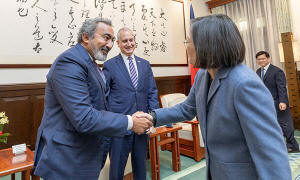|
Lai, from Taiwan's ruling Democratic Progressive Party (DPP) and
the current vice president, will take office on May 20. China,
which claims Taiwan as its own territory, believes he is a
dangerous separatist and has rejected his offers of talks.
Meeting with the leaders of the U.S. House of Representatives
Taiwan Caucus, Republican Representative Mario Diaz-Balart and
Democratic Representative Ami Bera, Lai said democracy and
freedom were core shared values with the U.S.
"Taiwan is situated in the first island chain and stands on the
frontline of China's authoritarian expansionism. This makes
Taiwan a crucial strategic location. Stability across the Taiwan
Strait is extremely important to regional and global peace and
prosperity," Lai said.
Lai added he would continue to defend the cross-Taiwan Strait
status quo of peace and stability.
"I hope the United States can continue to firmly support Taiwan,
deepen bilateral cooperation and relations and work with other
democratic partners to ensure peace and prosperity in the
region," he said.
"I also hope that the two co-chairs and our friends in the U.S.
Congress can continue to support Taiwan in bolstering its
self-defense capabilities."
Diaz-Balart told Lai his main message was that U.S. support for
Taiwan was firm, real and "100% bipartisan".
"Rest assured that you have the support of the United States
Congress," he said.
Speaking later to reporters, Bera, who also serves on the House
Committee on Foreign Affairs, said he anticipated Beijing may
"do some things" towards Taiwan before Lai takes office in May.
"My message is to Beijing: don't do that. Let's take a different
path forward to maintain the status quo, to maintain peace and
prosperity in the region, but they may not be listening to me."
Taiwan's government rejects China's sovereignty claims, saying
only Taiwan's people can decide their future.
The United States is Taiwan's most important international
backer and arms seller despite the lack of formal diplomatic
ties.
China has repeatedly warned the United States to stop its
support for Taiwan and the issue is a constant irritant in Sino-U.S.
relations.
Last week, Lai and President Tsai Ing-wen hosted two former
senior U.S. officials visiting as part of an unofficial
delegation sent by U.S. President Joe Biden.
(Reporting by Ben Blanchard; Editing by Kim Coghill, Michael
Perry, Raju Gopalakrishnan and Nick Macfie)
[© 2024 Thomson Reuters. All rights
reserved.]
Copyright 2022 Reuters. All rights reserved. This material may
not be published, broadcast, rewritten or redistributed.
Thompson Reuters is solely responsible for this content.

|
|




